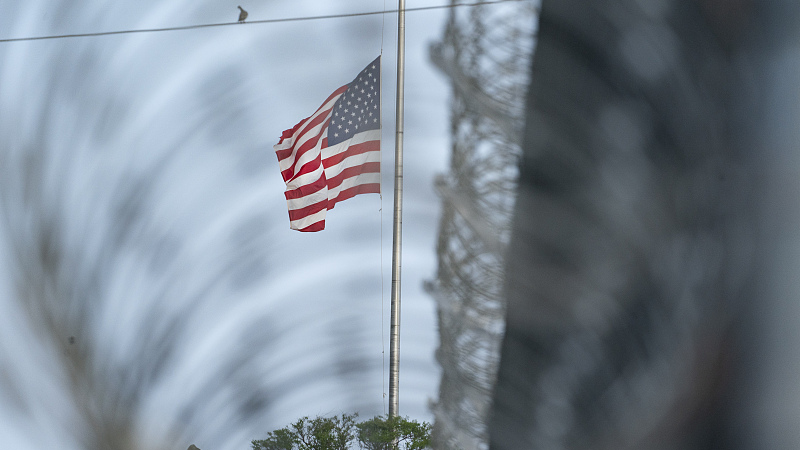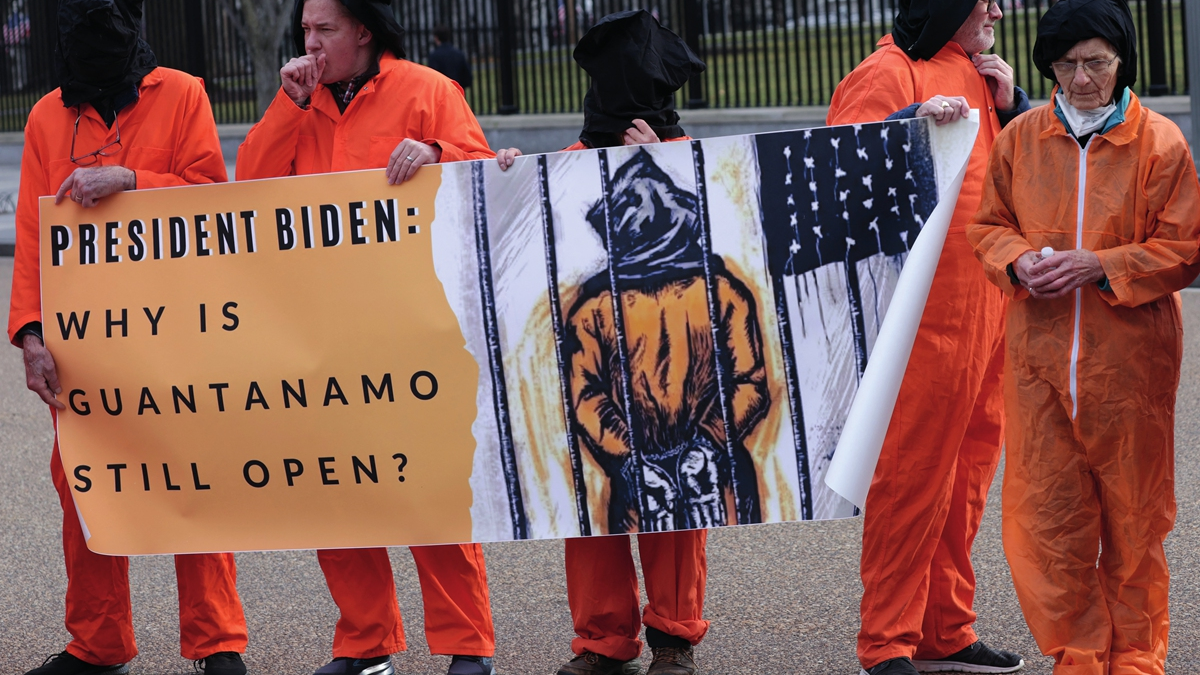
A U.S. national flag flies at half-staff as seen from Camp Justice in Guantanamo Bay Naval Base, Cuba, August 29, 2021. /CFP
A U.S. national flag flies at half-staff as seen from Camp Justice in Guantanamo Bay Naval Base, Cuba, August 29, 2021. /CFP
Editor's note: Bobby Naderi, a special commentator on current affairs for CGTN, is a London-based journalist, guest contributor in print, radio and television, and documentary filmmaker. The article reflects the author's opinions, and not necessarily the views of CGTN.
The ongoing rights violations at the Guantanamo Bay detention prison were once again highlighted in a recent study by a United Nations expert, Fionnuala Ni Aolain, which serves as a sobering reminder of the moral and legal difficulties the United States is facing.
According to the UN study, the prison's treatment of its inmates is cruel, inhumane, and humiliating, and the U.S. government is still reluctant to admit that it mistreated inmates and take the necessary actions to dismantle the facility, in spite of calls for an apology and compensation.
Keep in mind that the 1903 Treaty, which led to the establishment of the Guantanamo Base, was void from the start because it was imposed through coercion following the U.S. military occupation of Cuba. The pact was enforceable in 1903, but it is now against the law in the post-colonial era. After World War II, the process of decolonization was under way and outdated, as unfair colonial laws were being replaced by a new set of norms and principles based on the UN Charter.
The Treaty violates sovereignty laws. In accordance with Vienna Convention Article 56, a treaty without an expiration clause may be renounced or withdrawn from. Saying that a lease has no end is quite irrational considering that no previous international lease has lasted longer than 99 years and that this one has gone over 100 years with no sign of stopping.
Given the illegality of the situation, America's continued occupation of Cuba's Guantanamo Bay goes directly against the ideals of the UN Charter, which emphasizes "the right to self-determination and the right to dispose of all peoples' natural resources."
Legal excuses
The U.S. administration is incorrect in claiming that Guantanamo Bay is outside of American territory, which has sparked legal discussions about whether or not the inmates are subject to both domestic and international laws. The U.S. has been able to avoid accepting full responsibility for its actions due to this uncertainty.
Additionally, it is incorrect for the U.S. government to keep citing the need for national security to support its activities at Guantanamo Bay, particularly in the wake of the 9/11 attacks. By designating the inmates as "foreign militant suspects," the rotten apples have attempted to create a legislative framework that places security before personal freedom.
Justice should never be obstructed by the lack of a clear legal framework for handling the detention and treatment of Guantanamo detainees. Many detainees have been imprisoned without being given a chance to defend themselves or access to appropriate legal procedures, preventing them from challenging their incarceration or pursuing compensation for their mistreatment.

Activists in orange jumpsuits, representing the 35 men who are still being held at the U.S. detention facility in Guantanamo Bay, Cuba, protest in front of the White House Washington, U.S., January 11, 2023. /AFP
Activists in orange jumpsuits, representing the 35 men who are still being held at the U.S. detention facility in Guantanamo Bay, Cuba, protest in front of the White House Washington, U.S., January 11, 2023. /AFP
U.S. President Joe Biden said that the facility should be shut down, but the lack of a firm strategy shows that there is no political will to right the wrongs that have been done at Guantanamo Bay. This demonstrates an unwillingness to address the violations of human rights carried out by American forces to the sound of trumpets.
Expressing regret and making amends to the Guantanamo detainees may pave the way for legal action and financial restitution from the victims. Nonetheless, the U.S. administration is concerned that admitting wrongdoing may set a precedent that might harm its standing and reputation for lecturing others on human rights.
Double standards
The continuous violations of human rights at Guantanamo Bay and the U.S. government's resistance to express regret and change direction create significant concerns about double standards in the area of human rights. These actions present no chance for the political elite in Washington to learn important lessons about the need of applying human rights principles consistently and avoiding selective enforcement. Washington needs to understand how crucial it is to consistently uphold human rights standards, regardless of political or security-related reasons.
This repeated failure exposes an unsettling habit of impunity. Due to Guantanamo Bay's murky legal status, the U.S. government has been able to avoid taking responsibility for its deeds. To guarantee that human rights are safeguarded and that no state can take advantage of legal ambiguities to conduct abuses without repercussions, international law must be clear and coherent.
Guantanamo has become an island outside the law where terrorist suspects may be held without due process, subjected to unrestrained interrogation and cruelty. The necessity of open communication and collaboration with the UN is highlighted by Washington's failure to admit its mistreatment of detainees. Washington is not willing to create an atmosphere where it can have productive conversations regarding the UN's concerns about human rights.
It appears that Washington will stop at nothing to frustrate international attempts to close Guantanamo under the guise of virtue. The continued incarceration and mistreatment of inmates serve as a reminder of the importance of empowering civil society organizations to identify and address discrimination. The idea that the U.S. government would ever be willing to provide the UN with platforms and resources to take action and support the closure of the notorious facility is just an optimistic thinking given the current climate.
(If you want to contribute and have specific expertise, please contact us at opinions@cgtn.com. Follow @thouse_opinions on Twitter to discover the latest commentaries in the CGTN Opinion Section.)